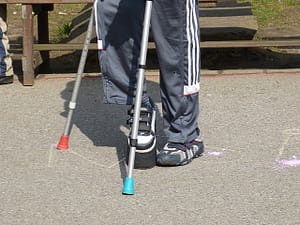Police officers put their lives on the line every day to protect and serve our communities. But what about the risks they face to their health? In this blog post, we take a closer look at the often-overlooked dangers that police officers encounter in the line of duty. From physical injuries to mental health challenges, we explore the various health risks faced by those who wear the badge and discuss strategies for supporting their well-being. Join us as we shine a light on this important topic and show our appreciation for those who risk it all to keep us safe.
Physical Injuries and Strain
 One of the most obvious health challenges faced by police officers is the risk of physical injuries and strain associated with the job. From foot pursuits and physical altercations to carrying heavy gear and sitting in patrol cars for extended periods, police work can take a toll on the body. Common injuries include strains, sprains, back pain, and musculoskeletal issues. Officers need to prioritize proper body mechanics, regular exercise, and adequate rest to prevent injuries and promote physical resilience. For example, shoap law offices reported that police officers have shown an increased risk of injuries from wearing body armor, particularly on the hips and lower back.
One of the most obvious health challenges faced by police officers is the risk of physical injuries and strain associated with the job. From foot pursuits and physical altercations to carrying heavy gear and sitting in patrol cars for extended periods, police work can take a toll on the body. Common injuries include strains, sprains, back pain, and musculoskeletal issues. Officers need to prioritize proper body mechanics, regular exercise, and adequate rest to prevent injuries and promote physical resilience. For example, shoap law offices reported that police officers have shown an increased risk of injuries from wearing body armor, particularly on the hips and lower back.
Mental Health and Stress
The demanding and often high-pressure nature of police work can also have a significant impact on mental health and well-being. Police officers are frequently exposed to traumatic events, violence, and life-threatening situations, which can lead to stress, anxiety, depression, and post-traumatic stress disorder (PTSD). The stigma surrounding mental health in law enforcement can make it challenging for officers to seek help, but it’s crucial to prioritize self-care, seek support when needed, and access resources such as counseling and peer support programs.
Sleep Deprivation and Shift Work
The irregular and often unpredictable hours of police work, including overnight shifts and rotating schedules, can disrupt sleep patterns and contribute to chronic sleep deprivation. Poor sleep quality and quantity can impair cognitive function, mood, and overall health, increasing the risk of accidents, errors, and chronic health conditions. Police officers should prioritize establishing healthy sleep habits, creating a conducive sleep environment, and seeking assistance from healthcare professionals if sleep problems persist.
Nutrition and Dietary Challenges
Maintaining a balanced and nutritious diet can be challenging for police officers, who may face limited access to healthy food options while on duty and irregular meal times due to the demands of the job. Poor nutrition can negatively impact energy levels, mood, and overall health, increasing the risk of chronic diseases such as obesity, diabetes, and heart disease. Officers need to plan ahead, pack healthy snacks and meals for shifts, and make conscious choices to prioritize nutrition and hydration.
Substance Abuse and Addiction
The stress, trauma, and demands of police work can also increase the risk of substance abuse and addiction among officers as a coping mechanism for managing emotional distress and mental health symptoms. Alcohol, prescription medications, and illicit drugs may be used as a way to self-medicate and numb difficult feelings, but they can ultimately exacerbate health problems and impair job performance. Officers need to be aware of the signs of substance abuse, seek help if needed, and access resources for support and treatment.
In conclusion, police officers face a variety of health challenges that can impact their physical, mental, and emotional well-being. Law enforcement agencies need to prioritize officer wellness and provide access to resources and support services to address these challenges effectively. By promoting a culture of health and wellness, implementing strategies to prevent injuries and manage stress, and fostering a supportive environment for officers to seek help when needed, we can ensure that those who serve and protect our communities are able to thrive both on and off the job.
